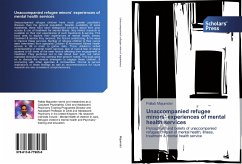Unaccompanied refugee children have much greater psychiatric illnesses than the general population. Despite availability of some treatments, there have been widespread concerns about their poor access & use of treatment for mental illness. Very limited research is available on their own experiences of such treatments & service. This book aims to explore their experiences of mental health, illness, treatment & service they received, the factors contributing, & the ways to improve these services. Number of refugee children & their carers were interviewed from specialist Children & Adolescent Mental Health service in UK in order to gather data. These children's limited understanding of mental health services, lack of trust & fear of stigma appears to be some of the main factors affecting their engagement in treatment. They preferred not to talk about their past, but rather expected clinicians to help address their present needs. This book goes on to discuss the various strategies toengage these children, & connecting with other agencies & communities. Clinical & service implications of these findings as well as recommendations for future research are also considered comprehensively.
Bitte wählen Sie Ihr Anliegen aus.
Rechnungen
Retourenschein anfordern
Bestellstatus
Storno








